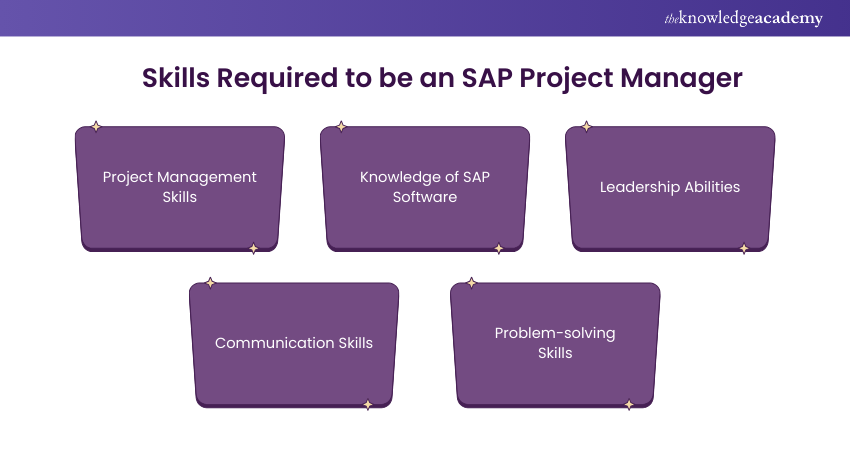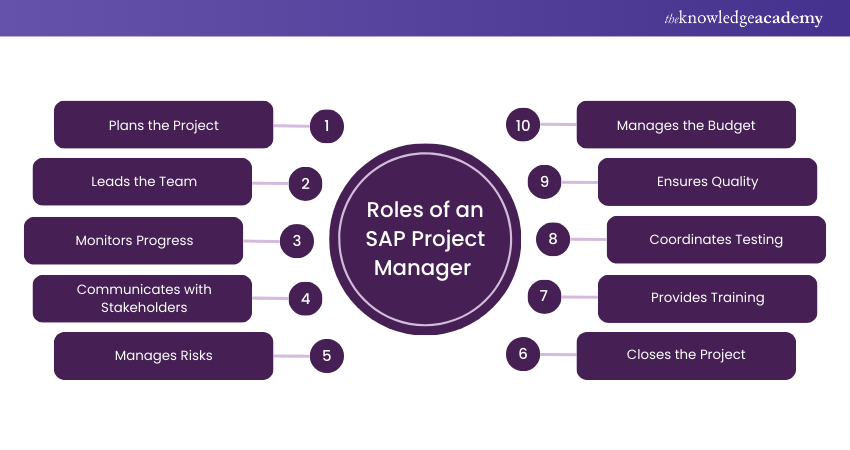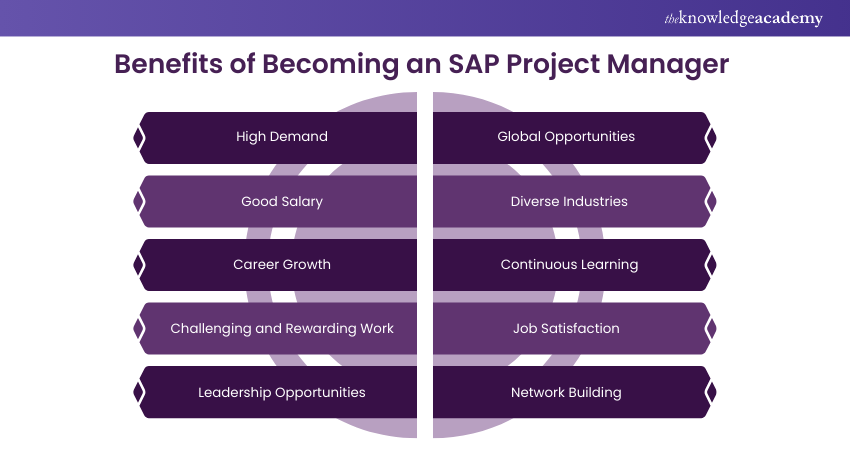We may not have the course you’re looking for. If you enquire or give us a call on 01344203999 and speak to our training experts, we may still be able to help with your training requirements.
We ensure quality, budget-alignment, and timely delivery by our expert instructors.

If you’ve ever wondered what it takes to lead a successful SAP project, you’re in the right place. An SAP Project Manager is the driving force behind complex projects, ensuring everything runs smoothly and meets the company’s goals.
In this blog, we discuss the key skills needed, the benefits of the role, and the challenges that come with it. Whether you’re aspiring to become an SAP Project Manager or just curious about it, this blog gives you a clear overview of the journey.
Table of Contents
1) Who is an SAP Project Manager?
2) What are the Skills Required to be an SAP Project Manager?
3) What Does an SAP Project Manager do?
4) How to Become an SAP Project Manager?
5) Benefits of Becoming an SAP Project Manager
6) What are the Challenges Faced by an SAP Project Manager?
7) Conclusion
Who is an SAP Project Manager?
An SAP Project Manager is a professional responsible for overseeing and guiding projects involving SAP software. SAP (Systems, Applications, and Products) is a widely used system for managing various business processes. The SAP Project Manager ensures the projects are delivered on time and within budget.
This involves coordinating with different teams, managing resources, and solving any issues that arise during the project. They are the key person ensuring that the SAP implementation or upgrade runs smoothly and successfully. For a detailed roadmap of best practices in managing such projects, a SAP S/4HANA Guide can offer valuable insights and strategies to help ensure a seamless and effective implementation process.
What are the Skills Required to be an SAP Project Manager?
Here are the essential skills required for this role:

a) Project Management Skills: Strong skills in planning, organising, and managing projects are essential. These skills ensure that projects are done on time and within budget.
b) Knowledge of SAP Software: A thorough understanding of SAP systems and their functions is crucial. This knowledge enables informed decision-making and effective management of SAP-specific challenges.
c) Leadership Abilities: The ability to lead and motivate a team is important. Effective leadership helps maintain focus and encourages teamwork towards achieving project goals.
d) Communication Skills: Clear communication is key for interacting with team members and stakeholders. It ensures everyone is aligned and helps in resolving issues promptly.
e) Problem-solving Skills: Identifying and solving problems is vital for overcoming obstacles. Effective problem-solving helps keep the project on track and manage unexpected challenges.
Learn how SAP can revolutionize your business processes. Sign up our SAP Training now!
What Does an SAP Project Manager do?
An SAP Project Manager leads and manages projects that involve SAP software. Here are the SAP Project Manager roles and responsibilities:

a) Plans the Project: The SAP Project Manager creates a detailed project plan at the start. This plan includes the project’s goals, the timeline for each phase, and the resources required. It serves as a roadmap to guide the project from beginning to end.
b) Leads the Team: The manager is responsible for assembling and leading a team of experts, including developers, consultants, and business analysts. They ensure that team member understands their role and responsibilities. Regular team meetings are held to keep everyone on the same page.
c) Monitors Progress: The manager tracks the project’s progress closely to ensure that it stays on schedule. They use tools and software to monitor timelines, task completions, and overall project health. If there are delays or issues, they take immediate action to resolve them.
d) Communicates with Stakeholders: The SAP Project Manager regularly communicates with stakeholders, such as company leaders and clients. They provide updates on the project’s progress, including any challenges or changes. Clear communication helps keep everyone informed and aligned with the project’s goals.
e) Manages Risks: Identifying potential risks early is a key responsibility of the manager. They assess what could go wrong during the project and develop plans to avoid or minimise these risks. This proactive approach helps prevent problems from derailing the project.
Discover the power of seamless integration with our SAP Cloud Platform Integration PDF. Download today for expert tips and strategies to optimize your cloud setup.
f) Manages the Budget: They are in charge of the project’s budget, ensuring that spending stays within the allocated limits. They track costs carefully and make adjustments if needed to avoid overspending. Keeping the project on budget is crucial for its success.
g) Ensures Quality: Quality Management is a critical part of the Project Manager’s role. They ensure that all deliverables meet the company’s quality standards and SAP’s guidelines. This includes regular reviews and testing to catch any issues early.
h) Coordinates Testing: Before the SAP system is fully implemented, the manager oversees thorough testing. This phase ensures that the system works as expected and that any bugs or issues are fixed. Testing helps prevent major problems after the system goes live.
i) Provides Training: The manager arranges training sessions for the team and end-users. This training is essential for ensuring that everyone knows how to use the new SAP system effectively. Well-trained users are key to the system’s success and smooth operation.
j) Closes the Project: Once the project is completed, the manager ensures that all final tasks are wrapped up. They document the project’s outcomes and lessons learned and then hand over the completed project to the company. This last step marks the completion of the SAP implementation.
Unlock Seamless Integration: Download the SAP Cloud Platform Integration PDF to explore how to connect applications and systems effortlessly.
How to Become an SAP Project Manager?
Becoming an SAP Project Manager involves a combination of education, experience, and specialised skills. Here's a simple step on how you can achieve this role:
a) Get a Relevant Degree: Start by earning a bachelor's degree in a field related to business, information technology, or Project Management. This foundational education will give you the necessary knowledge to manage projects and understand business processes.
b) Gain Experience in Project Management: Work on gaining experience in Project Management, even if it’s in a different industry. You can start by taking on small projects or supporting roles in project teams. This experience will help you develop skills like leadership, communication, and time management.
c) Learn About SAP Software: Develop a deep understanding of SAP software by taking courses and certifications related to SAP Modules. You should become familiar with how SAP systems work and how they are used in business environments. Hands-on experience with SAP is highly valuable.
d) Earn a Project Management Certification: Obtain a recognised certification, such as PMP (Project Management Professional) or PRINCE2. These certifications showcase your expertise in Project Management principles and practices, making you a more competitive candidate.
e) Gain Experience in SAP Projects: Try to work on projects that involve SAP implementation or management. This could be through roles like SAP Consultant, SAP Analyst, or as part of an SAP project team. Real-world experience with SAP projects is crucial for understanding the challenges and requirements of the role.
f) Stay Updated with Industry Trends: The world of SAP and Project Management is always evolving. Stay informed about the trends, tools, and best practices in both fields. Continuous learning keeps your skills relevant and help you adapt to changes in the industry.
g) Network with Professionals: Join professional networks, attend industry events, and connect with other SAP professionals. It can open doors to opportunities, provide insights from experienced professionals, and help you advance in your career.
Learn the processes of financial accounting with our SAP Financial Accounting Training – Join today!
Benefits of Becoming an SAP Project Manager
Here are the Benefits of becoming an SAP Project Manager:

a) High Demand: SAP Project Managers are in high demand because many companies use SAP software to manage their business operations. This demand means more job opportunities and job security.
b) Good Salary: SAP Project Managers often earn a high salary. The specialised skills and expertise required for the role are valued by employers, leading to competitive pay.
c) Career Growth: Working as an SAP Project Manager can open doors to higher-level management positions. The experience you gain in this role can help you advance in your career.
d) Challenging and Rewarding Work: The role involves solving complex problems and leading important projects. This makes the job challenging but also rewarding, as you can see the impact of your work.
e) Leadership Opportunities: As an SAP Project Manager, you lead a team of professionals. This gives you the chance to develop and showcase your leadership skills.
f) Global Opportunities: SAP is used by companies all around the world. This means you could have the chance to work internationally or with global teams, broadening your experience.
g) Diverse Industries: SAP is used in many industries, from finance to manufacturing. As an SAP Project Manager, you can work in different sectors, giving you a varied and interesting career.
h) Continuous Learning: The field of SAP and Project Management is always evolving. This role allows you to keep learning new skills and stay updated with the trends, keeping your work fresh and exciting.
i) Job Satisfaction: Successfully managing an SAP project can bring a lot of satisfaction. Seeing a project through from beginning to end and helping a company improve its operations is fulfilling.
j) Network Building: Working in this role allows you to build a strong professional network. You connect with other professionals in your field, which can lead to opportunities and collaborations.
Understand the digital transformation in SAP cloud with our SAP Cloud Platform Training – Join today!
What are the Challenges Faced by an SAP Project Manager?
The SAP Project Manager faces several challenges on any given day. Here are some common challenges that an SAP Project Manager might have to face in the workplace:
a) Complex Project Requirements: SAP projects often involve complex and detailed requirements that can be challenging to manage. Understanding and aligning these requirements with the project goals requires careful planning and communication.
b) Managing Stakeholder Expectations: Stakeholders may have high or conflicting expectations about the project’s outcomes. Balancing these expectations while staying within the project’s constraints can be difficult. Effective negotiation skills are crucial to address and manage these expectations.
c) Budget Constraints: Staying within the project budget can be challenging, especially if unexpected issues arise. Costs can escalate if not carefully monitored and managed. An SAP Project Manager needs to find ways to address problems.
d) Integration Issues: Integrating SAP systems with existing business processes or other software can be complex. Technical challenges and compatibility issues may arise during integration. Resolving these issues requires technical expertise.
e) Team Coordination: Leading a diverse team with different skills and roles can be challenging. Ensuring that all team members work together effectively and stay focused on the project goals requires strong coordination. Miscommunication or lack of collaboration can impact the project’s success.
Learn how to monitor protocols with our SAP BASIS Course – Join today!
Conclusion
We hope this blog has helped you understand the role of an SAP Project Manager and the benefits and challenges that come with it. This role offers exciting opportunities for career growth, leadership, and high earning potential, with an understanding of the SAP Consultant Salary playing a key part in recognising the earning potential of those in leadership roles. While the role involves managing complex projects and balancing stakeholder expectations, the rewards are substantial. With the right skills and experience, you can succeed in this field.
Want to stand out in your SAP interview? Review our SAP Interview Questions and Answers to boost your chances of success!
Frequently Asked Questions
What are the Best Practices for Managing an SAP project?

Some of the recommendations for managing an SAP project include goal definition and communication with the team as well as other stakeholders. The project progress needs to be checked on and the plans altered where necessary to ensure that everything is on the right track.
What are the Common Risk Factors in SAP projects?

Common risk factors in SAP projects include scope creep, where project requirements expand beyond the original plan, and integration issues with existing systems. Additionally, managing stakeholder expectations and staying within budget can also pose challenges.
What are the Other Resources and Offers Provided by The Knowledge Academy?

The Knowledge Academy takes global learning to new heights, offering over 3,000 online courses across 490+ locations in 190+ countries. This expansive reach ensures accessibility and convenience for learners worldwide.
Alongside our diverse Online Course Catalogue, encompassing 19 major categories, we go the extra mile by providing a plethora of free educational Online Resources like News updates, Blogs, videos, webinars, and interview questions. Tailoring learning experiences further, professionals can maximise value with customisable Course Bundles of TKA.
What is The Knowledge Pass, and How Does it Work?

The Knowledge Academy’s Knowledge Pass, a prepaid voucher, adds another layer of flexibility, allowing course bookings over a 12-month period. Join us on a journey where education knows no bounds.
What are Related Courses and Blogs Provided by The Knowledge Academy?

The Knowledge Academy offers various SAP Training, including the SAP Financial Accounting Course, SAP Cloud Platform Training, and SAP BASIS Course. These courses cater to different skill levels, providing comprehensive insights into SAP.
Our IT Infrastructure & Networking Blogs cover a range of topics related to SAP, offering valuable resources, best practices, and industry insights. Whether you are a beginner or looking to advance your SAP knowledge, The Knowledge Academy's diverse courses and informative blogs have got you covered.
Upcoming IT Infrastructure & Networking Resources Batches & Dates
Date
 SAP Finance and Controlling FICO Training
SAP Finance and Controlling FICO Training
Mon 4th Aug 2025
Mon 3rd Nov 2025






 Top Rated Course
Top Rated Course



 If you wish to make any changes to your course, please
If you wish to make any changes to your course, please


